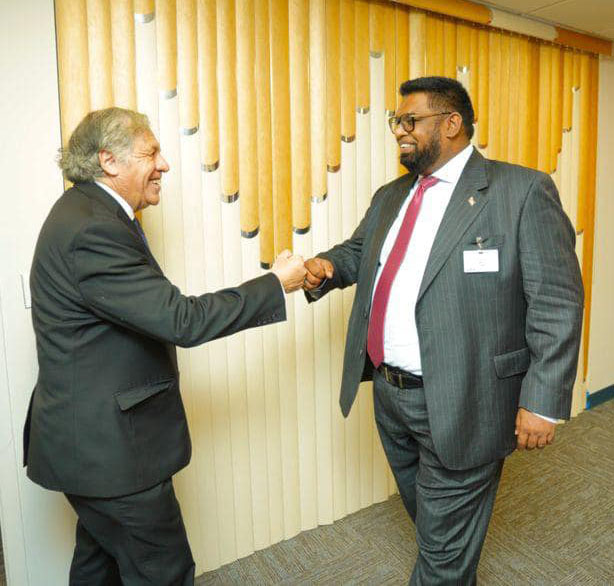
President Irfaan Ali (right) greeting OAS Secretary General Luis Almagro yesterday (Office of the President photo)
September 22 ,2021
Guyana has engaged the Secretary-General of the Organization of American States (OAS), Luis Almagro on recent attempts by Venezuela’s government and opposition to use the border controversy between the two countries as a point of negotiation.
According to a statement from the Office of the President, a number of matters were highlighted by Guyanese officials in the meeting held yesterday at the Office of the Permanent Mission to Guyana in New York.
Among the issues discussed with Almagro were the strengthening of democracy in Guyana through electoral reform, support for Guyana’s position on the border controversy with Venezuela and Guyana’s position following the Venezuelan Government-Opposition accord reached earlier this month.
“President Ali reaffirmed that while his government welcomes efforts to bring about domestic harmony within Venezuela, agreements that defy international law and processes can form no basis for mediating such harmony,” the statement noted.
Guyana, Ali maintained will look towards the court and the rule of law particularly the International Court of Justice (ICJ) to settle this issue.
Last December after decades of impasse Guyana gained a significant victory in the attempt to definitively settle the controversy when the ICJ ruled that it has jurisdiction to determine the validity of the 1899 Arbitral Award on the frontier between Guyana and Venezuela.
The Court – the principal judicial organ of the United Nations – also declared that it could address the related question of the definitive settlement of the land boundary controversy between the two countries.
Venezuela has chosen not to participate in the case. However, earlier this month during talks in Mexico City, Venezuela’s government and opposition representatives reached a partial agreement on its claim to Guyana’s Essequibo region. Venezuela has sought to claim most of Guyana’s Atlantic waters, which includes the offshore Stabroek Block, where ExxonMobil is leading oil production.
The agreement between the two Venezuelan factions was brokered by Norway alongside representatives from the Netherlands, Bolivia, Russia and Turkey.
According to Agence France-Presse (AFP), the Nicolas Maduro government and the opposition coalition agreed that Venezuela has a “historic and inalienable” claim to Guyana’s Essequibo region.
Guyana has objected to the inclusion of the matter in these negotiations and suggested that the countries which brokered the pact should encourage Venezuela to take part in the judicial settlement of the issue.
“As far as we are concerned, if they have an engagement, whichever country believes that they have an engagement with Venezuela in resolving their internal issues, they should stick to the internal issues. The issue of the controversy that exists in the border has nothing to do with their internal issues and it has already been determined where that issue will be settled and it’s at the ICJ. What we can ask those countries to do is to encourage Venezuela to participate and be active in the ICJ,” Ali had previously told reporters.
In addition to the border issue, the Head of State and the Secretary-General also discussed technical support to advance the country’s development agenda.
President Ali was joined by Vice President Bharrat Jagdeo; Ambassador and Permanent Representative to the United Nations, Carolyn Rodrigues-Birkett, and Foreign Secretary, Robert Persaud.
